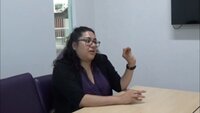| Title |
Felix, Viviana OH19_103 |
| Creator |
Weber State University, Stewart Library: Oral History Program. |
| Contributors |
Felix, Viviana, Interviewee; Matthewson, Sara, Interviewer; Storey, Sarah, Video Technician |
| Description |
The Beyond Suffrage Project was initiated to examine the impact women have had on northern Utah. Weber State University explored and documented women past and present who have influenced the history of the community, the development of education, and are bringing the area forward for the next generation. The project looked at how the 19th Amendment gave women a voice and representation, and was the catalyst for the way women became involved in the progress of the local area. The project examines the 50 years (1870-1920) before the amendment, the decades to follow and how women are making history today. |
| Abstract |
The following is an oral history interview with Viviana Felix, conducted on June 10, 2019 in the Stewart Library, by Sarah Mathewson. Viviana discusses her life, her memories, and the impact of the 19th Amendment. Sarah Storey, the video technician, is also present during this interview.; The following is a video clip of an oral history interview with Viviana Felix, conducted on June 10, 2019. In this video clip, Viviana discusses her definition of courage and how that applies to women in the workforce. |
| Image Captions |
Viviana Felix Circa 2018; Viviana Felix speaking about the definition of courage and how it applies to women in the workforce. |
| Subject |
Voting--United States; Women--suffrage; Women--Rights of women |
| Keywords |
Women of Color; Politics; Ogden City Diversity Affairs Offices; Ogden Citys Christmas Village; Sociology; Political Science; Pre-law; Convergys |
| Digital Publisher |
Stewart Library, Weber State University, Ogden, Utah, United States of America |
| Date |
2019 |
| Date Digital |
2019 |
| Temporal Coverage |
1990; 1991; 1992; 1993; 1994; 1995; 1996; 1997; 1998; 1999; 2000; 2001; 2002; 2003; 2004; 2005; 2006; 2007; 2008; 2009; 2010; 2011; 2012; 2013; 2014; 2015; 2016; 2017; 2018; 2019 |
| Medium |
oral histories (literary genre) |
| Spatial Coverage |
Ogden, Weber County, Utah, United States, http://sws.geonames.org/11788968, 41.22809, -111.96766; District of Columbia, Washington, D.C., United States, http://sws.geonames.org/4138106, 38.91706, -77.00025; Duarte, Los Angeles, California, United States, http://sws.geonames.org/5344147, 34.13945, -117.97729; El Monte, Los Angeles, California, United States, http://sws.geonames.org/5345743, 34.06862, -118.02757; Mexico, http://sws.geonames.org/3996063, 23, -102; New Zealand, http://sws.geonames.org/2186224, -42, 174; Roy, Weber, Utah, United States, http://sws.geonames.org/5780802, 41.16161, -112.02633 |
| Type |
Text; Image/StillImage; Image/MovingImage |
| Access Extent |
31 page PDF; Video clip is an mp4 file, 76.7 MB |
| Conversion Specifications |
Filmed using a Sony HDR-CX430V digital video camera. Sound was recorded with a Sony ECM-AW3(T) bluetooth microphone. Transcribed using Express Scribe Transcription Software Pro 6.10 Copyright NCH Software. |
| Language |
eng |
| Rights |
Materials may be used for non-profit and educational purposes, please credit University Archives; Weber State University; Music from Uppbeat (free for Creators!): https://uppbeat.io/t/yeti-music/gentle-breeze; License code: IWGKRYG7XHQOMZY0; Music from Uppbeat (free for Creators!): https://uppbeat.io/t/simon-folwar/hope; License code: KYI5VLB63GF1TXND |
| Source |
Felix, Viviana OH19_103 Weber State University Archives |
| Format |
application/pdf; video/mp4 |
| ARK |
ark:/87278/s6qjx7zw |
| Setname |
wsu_bs_oh |
| ID |
105507 |
| Reference URL |
https://digital.weber.edu/ark:/87278/s6qjx7zw |
| Title |
Felix, Viviana OH19_103 |
| Creator |
Weber State University, Stewart Library: Oral History Program. |
| Contributors |
Felix, Viviana, Interviewee; Matthewson, Sara, Interviewer; Storey, Sarah, Video Technician |
| Description |
The Beyond Suffrage Project was initiated to examine the impact women have had on northern Utah. Weber State University explored and documented women past and present who have influenced the history of the community, the development of education, and are bringing the area forward for the next generation. The project looked at how the 19th Amendment gave women a voice and representation, and was the catalyst for the way women became involved in the progress of the local area. The project examines the 50 years (1870-1920) before the amendment, the decades to follow and how women are making history today. |
| Abstract |
The following is an oral history interview with Viviana Felix, conducted on June 10, 2019 in the Stewart Library, by Sarah Mathewson. Viviana discusses her life, her memories, and the impact of the 19th Amendment. Sarah Storey, the video technician, is also present during this interview. |
| Image Captions |
Viviana Felix Circa 2018 |
| Subject |
Voting--United States; Women--suffrage; Women--Rights of women |
| Keywords |
Women of Color; Politics; Ogden City Diversity Affairs Offices; Ogden Citys Christmas Village; Sociology; Political Science; Pre-law; Convergys |
| Digital Publisher |
Stewart Library, Weber State University, Ogden, Utah, United States of America |
| Date Digital |
2019 |
| Temporal Coverage |
1990; 1991; 1992; 1993; 1994; 1995; 1996; 1997; 1998; 1999; 2000; 2001; 2002; 2003; 2004; 2005; 2006; 2007; 2008; 2009; 2010; 2011; 2012; 2013; 2014; 2015; 2016; 2017; 2018; 2019 |
| Medium |
oral histories (literary genre) |
| Spatial Coverage |
Ogden, Weber County, Utah, United States, http://sws.geonames.org/11788968, 41.22809, -111.96766; District of Columbia, Washington, D.C., United States, http://sws.geonames.org/4138106, 38.91706, -77.00025; Duarte, Los Angeles, California, United States, http://sws.geonames.org/5344147, 34.13945, -117.97729; El Monte, Los Angeles, California, United States, http://sws.geonames.org/5345743, 34.06862, -118.02757; Mexico, http://sws.geonames.org/3996063, 23, -102; New Zealand, http://sws.geonames.org/2186224, -42, 174; Roy, Weber, Utah, United States, http://sws.geonames.org/5780802, 41.16161, -112.02633 |
| Type |
Text; Image/StillImage |
| Access Extent |
31 page PDF |
| Language |
eng |
| Rights |
Materials may be used for non-profit and educational purposes, please credit University Archives; Weber State University |
| Source |
Felix, Viviana OH19_103 Weber State University Archives |
| Format |
application/pdf |
| Setname |
wsu_bs_oh |
| ID |
105703 |
| Reference URL |
https://digital.weber.edu/ark:/87278/s6qjx7zw/105703 |





